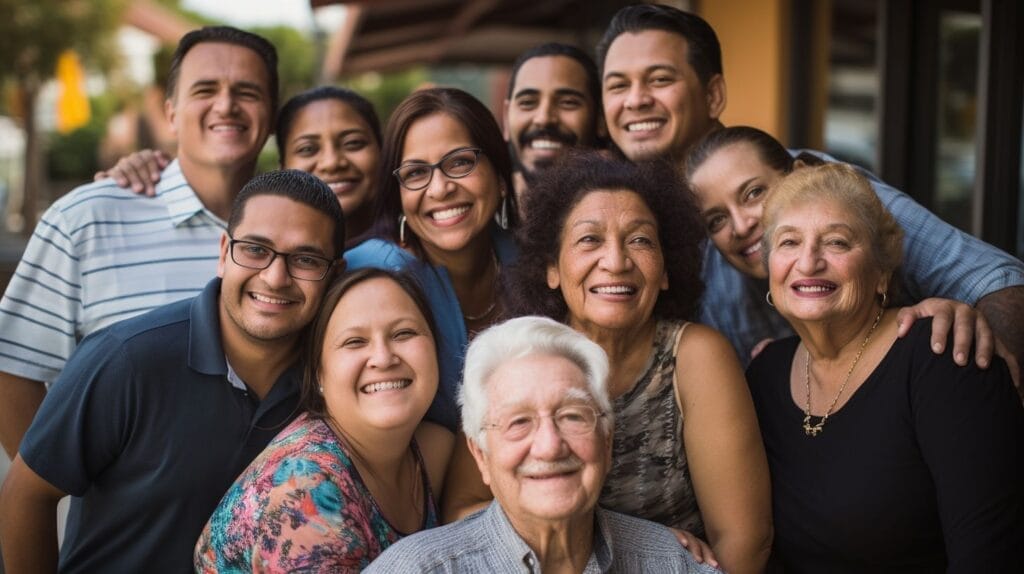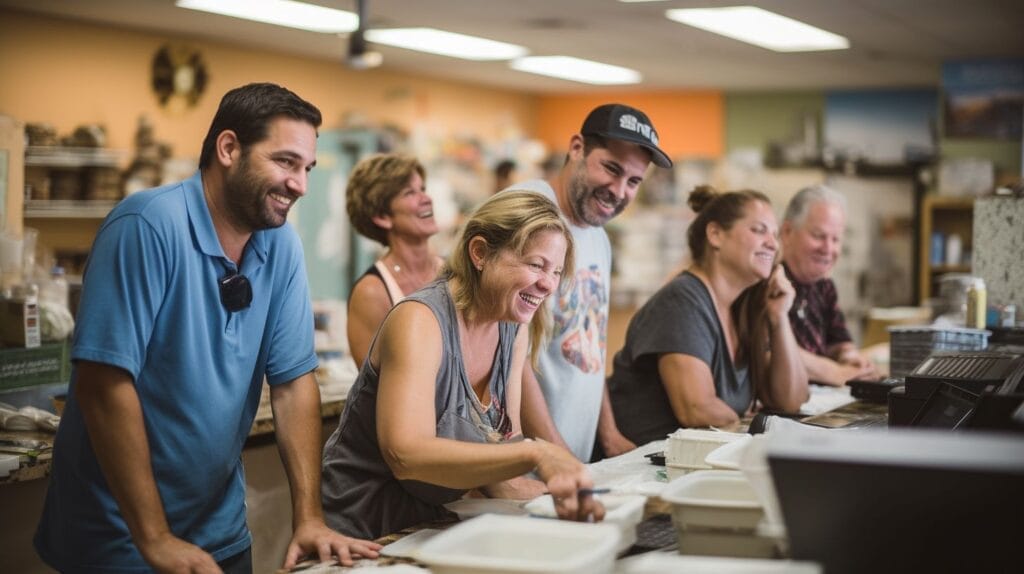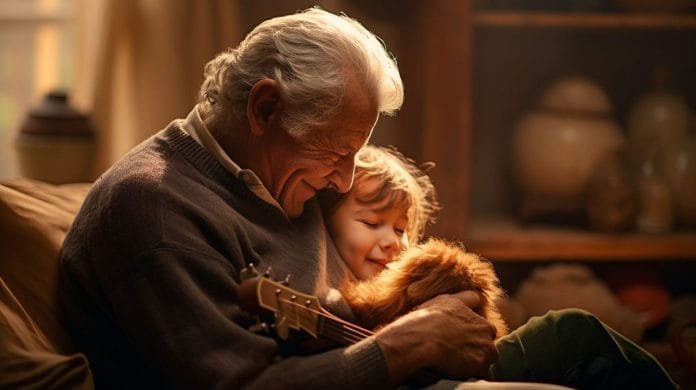Displaying a measure of concern that surpasses personal wants encapsulates the accurate meaning of empathy and profound compassion. This is the core principle of the ‘Caring Heart Meanings’. This forges a bond between us, equipping us to deeply impact each other’s lives. After devoting many years to the study of the psychology of care and empathy, I am distinctively equipped to offer insights based on academic research and firsthand life experiences and observations.
This journey is not merely about feel-good moments or simple kindness—it’s about nurturing a state of being where care becomes as natural as breathing. A caring heart does more than feel; it acts intentionally and purposefully. Recent studies underscore its pivotal role within personal connections and broader societal contexts—where such empathy can foster cohesion, support mental health, and lay solid foundations for future generations.
Continue reading to discover how empathy threads are woven together for individual growth and social harmony. Let this guidepost illuminate your journey toward deeper compassion.
Key Takeaways
- A compassionate heart is about thinking of others and helping with kind actions, not just lovely thoughts.
- People worldwide show care in different ways, like “omoiyari” in Japan and “ubuntu” in Africa, which both mean looking after one another.
- Empathy helps us connect with friends and family. Listening well and being mindful of feelings strengthen these bonds.
- Showing care can improve communities by bringing people together and making them feel loved.
- Caring is good for mental health because it makes us happy to help others and feel connected.
Understanding the Caring Heart Meaning

Dive into what truly defines a compassionate heart, an emblem of empathy and compassion deeply rooted in human connections across diverse cultures. Discover how this profound emotional trait impacts and enhances our interactions, shaping personal bonds and weaving the very fabric that holds communities together.
Discovering the Magic of Caring and Understanding! What is Empathy?
Definition and Characteristics of a Caring Heart
It implies thinking about others and wanting to help. It’s not just a nice thought; it manifests in what you do for people. With a compassionate heart, you give your time, kind words, and actions without waiting for a “thank you.” You understand how others feel and strive to make things better.
This kindness can transform how people perceive the world. Your acts of kindness can initiate a chain where more and more people help each other. Being caring brings people closer and spreads love.
It’s essential because it shields our world from becoming a battleground of conflicts and selfishness. With care, survival is easier. It is all about making life better for everyone around us, whether we know them or not.
Exploring Heart-Based Caring in Different Cultures
Heart-based care is not just one thing; it varies with place and tradition. Around the world, people express their big hearts in many ways. For instance, in Japan, there is a word, “omoiyari,” which means thinking of others’ feelings as if they were your own. It’s about looking out for each other without needing to be asked.
In Africa, a concept called “ubuntu” can be found. It says a person becomes a person through other people. This kind of caring believes we are all connected, and what helps one helps us all.
People take different paths to show love and kindness across cultures. These examples inspire you to see how big-heartedness shapes lives everywhere – including yours!
How Care Forms the Foundation of Interpersonal Relationships
Caring is like the glue that holds people together. When someone shows they care, it creates a strong bond that makes both feel safe and valued. Think of it as magic that turns strangers into friends and helps families stick together through tough times. Caring acts make us feel we belong and are essential to others.
This magic happens because when you show care, you tell someone their feelings matter. You listen with your heart, not just your ears, and share their joys and sorrows. This sharing builds trust and understanding between people, making them closer and more connected.
Ready to learn how to sprinkle this caring magic in your own life? Let’s explore empathy in everyday interactions next!
Caring for the Right in Front of You: Cultivating Empathy in Everyday Life

In your daily hustle, you might overlook the power of a moment of goodwill. Still, it’s right there – in every interaction lies an opportunity to cultivate empathy. Adopting this practice allows you to transform routine exchanges into gateways for deeper connection and understanding.
Practicing Mindfulness as a Pathway to Empathy
Mindfulness is a way to pay full attention to the moment. It helps you understand others better.
- Start by finding a quiet place each day. Sit and focus on your breathing. Notice each breath in and out.
- Pay attention to your thoughts. See them come and go without judging them as good or bad.
- Listen when people talk. Look at their face and hear their words without thinking about what to say next.
- Notice when you feel happy, sad, mad, or scared. Name each feeling softly in your mind.
- Watch how others act and move. Guess what they might be feeling by the look on their face or tone of voice.
Tools and Techniques for Empathetic Communication
Communicating with empathy helps you understand others better. It’s like a bridge that connects you to someone else’s feelings.
- Listen fully: Pay attention when someone is talking. Remember to think about what you’ll say next. Just focus on their words and emotions.
- Keep eye contact: When you look into someone’s eyes while they speak, it shows you care about what they’re saying.
- Ask open questions: Use questions that start with “what” or “how” to learn more about the other person’s thoughts.
- Echo feelings: If someone tells you they’re sad, say, “It sounds like this is tough for you.” It lets them know you understand how they feel.
- Body language matters: Nodding your head and leaning in, showing interest and involvement in the conversation.
- Pause before responding: Take a moment after the other person finishes speaking. It shows respect for their words and gives them time to think of a kind response.
- Share stories: If you have had a similar experience, share it briefly. It can make the other person feel less alone.
Nurturing Understanding and Goodwill in Everyday Interactions
Empathetic communication opens the garden where understanding and goodwill can bloom. You can make every talk you share with someone else warm and sunny. Think about how you feel when someone gets you.
It’s like a gift. Now imagine giving that same feeling to others.
Be present in your chats with friends or even strangers. Listen closely, nod, and smile to show you’re right there with them. Small acts of being there for someone—like helping carry their groceries or just sending an excellent text—can be enormous in their eyes.
Your goodwill doesn’t just improve their day; it stitches together stronger friendships and communities, too!
Developing a Caring Heart for Friends and Family

Cultivate a compassionate heart that becomes the lifeblood of your relationships, serving as a beacon of warmth and understanding for friends and family. Continue reading to uncover how you can enhance connection through empathy and active listening.
The Human Connection To Patient Care
The Importance of Emotional Availability and Active Listening
A compassionate heart means you are ready to hear what friends and family feel and need. When you show that their feelings matter, they feel loved and important. Listening well without getting distracted or judging helps them trust you more.
They will share more profound thoughts because they know you understand.
With your heart open and ears ready, every chat can strengthen bonds. You learn to solve problems with care, which makes everyone happier. This way of being there for others turns into a warm place where family and friends grow together.
Now, let’s consider how respecting boundaries also plays a big part in loving relationships.
Fostering Caring Relationships by Respecting Boundaries
Caring for others means understanding where your limits and their lines are drawn. You show love by knowing how much space to give them. It helps everyone feel safe and happy in the relationship.
It’s like a dance where people move together without stepping on each other’s toes.
Discuss what’s okay and not in the friendship or family tie to maintain this balance. Listen carefully when someone tells you they need room, and be clear about your needs.
This way, care stays strong without wearing anyone out or tensing things. Showing respect for these personal rules is a big part of having a compassionate heart that lasts.
Conflict Resolution with a Caring Heart
Conflicts are challenging, but solving them with a compassionate heart makes things better. It means listening well and thinking about how others feel. When you understand someone’s feelings, you can solve problems without making anyone upset.
It’s like being a friend who helps fix a fight.
A compassionate heart during conflict helps everyone get along and be happy again. You give goodwill, respect boundaries, and talk in ways that don’t hurt feelings. It stops minor problems from growing into big fights that are hard to fix.
Why a Caring Heart Matters? The Key Importance in Society

The pulsing core of a compassionate nature is not just felt in intimate circles. Still, it ripples out to invigorate entire communities, seeding the ground for collective well-being and growth. It’s your compassionate deeds that weave the fabric of society tighter—each thread an act of goodwill, each pattern a testament to our shared humanity.
The Role of a Compassionate Heart in Building Cohesive Communities
It is like glue for a community. It brings people together and lets them feel loved and respected. When you show empathy and goodwill, it encourages others in the community to do the same.
It creates strong bonds between neighbors, friends, and even strangers. Just imagine someone helping another person with groceries or simply sharing a smile – these small acts make everyone feel connected.
Having a compassionate nature can transform communities into happier places where people support each other. It makes us think about how our actions affect others around us. With every act of goodwill, we inspire more positive deeds in those who see them.
This cycle of care helps solve problems peacefully, share joy during good times, and provide comfort when life gets tough.
Impact of a Compassionate Nature on Mental and Emotional Well-being
Having a compassionate nature does wonders for your mind and feelings. Genuinely caring for others helps your brain feel good, boosting your happiness and reducing stress. This kind of goodwill can make you healthier by lowering blood pressure and giving you a sense of calmness.
It is like creating a circle of goodwill; when you help someone, they feel better, and so do you.
Taking care of people also makes strong bonds between everyone. Family and friends get closer when they know they can count on each other’s support during tough times. Being connected adds to feeling safe and loved, which is excellent for mental health.
Caring leads to more trust and less worry among people in communities too.
Importance of Care for Sustainable Societal Growth
It creates strong communities. When you show care, you build a bridge to someone else’s world. This bond helps everyone feel safer and happier. We need these connections to solve problems and make our neighborhoods better places to live.
Think about how caring shapes the world around us. Kind deeds often lead others to do good, too. It’s like planting seeds that grow into helpful habits for everyone. A society full of caring people is likelier to thrive because we look out for each other and work together for a brighter future.
How Can Understanding the Depths of Empathy Help in Dealing with Passive-Aggressive Behavior at the Workplace?
Understanding the depths of empathy can greatly assist in recognizing passive aggressive behavior in the workplace. By tuning into others’ emotions and perspectives, one can better detect subtle signs of passive aggressive behavior recognition and address it effectively, thereby promoting a healthier and more harmonious work environment.
Encourage a Caring Heart: Embracing Empathy and Compassion

Discover the transformative power of empathy and compassion as you embark on a journey of personal growth. This guide is dedicated to nurturing a compassionate nature within each of us. We invite you to explore various ways to develop and express your caring spirit.
The 22-Day Care Challenge and Its Benefits
We present the 22-day care challenge, a unique way to cultivate compassion and touch lives.
This challenge encourages daily acts of empathy and kindness:
- Focus on Others: Each day, find someone who could use a helping hand or a kind word.
- Notice the Little Things: Pay attention to small details in others’ lives where you can make a difference.
- Make Empathy a Daily Practice: Try to understand and feel what others are experiencing.
- Share Your Time: Sometimes, your presence is the most valuable gift you can offer.
- Listen More Than You Speak: Show others that their thoughts and feelings are important and valued.
- Perform Small Acts of Goodwill: Simple gestures, like a smile or holding a door open, can brighten someone’s day.
- Inspire Others: Encourage your friends to join you in this journey of spreading kindness.
- Reflect on Your Feelings: Keep track of how caring for others affects your own emotions.
- Observe the Changes Around You: As you show more care, notice the positive shifts in your environment and relationships.
Inspirational Stories of Compassion
Explore heartwarming stories from individuals who have walked this path of compassion. These narratives highlight how small, everyday actions can lead to significant, positive changes in both personal relationships and broader communities. From smiling at strangers to deeply listening to loved ones, these stories demonstrate the power of stepping out of one’s comfort zone to create a ripple effect of goodwill.
Empathy and Compassion in Everyday Life
We encourage you to integrate empathy and compassion into your daily routine, whether at home, work, or in your community. Our guide offers insights and tips on understanding others and reacting with heartfelt empathy. These practices not only enrich your own life but also contribute to building a kinder, more empathetic world.
Join us in this endeavor to grow a more caring nature and witness the profound impact of simple, compassionate actions in our lives and the lives of those around us.
Conclusion

You’ve learned that a caring nature is all about being kind and helping others. Think of times when you can be more affectionate in your day. Isn’t it great how simple acts of goodwill can make significant changes? Remember, everyone can grow their empathy and compassion.
What will you do today to show care? Check out our other articles for even more tips on building a loving nature. Let’s keep spreading kindness together!
Frequently Asked Questions
What does having a caring heart mean?
It means you feel concern for others, show goodwill, and often put their wellness above your self-interest.
What are the types of empathy linked to a caring nature?
There are two main types: cognitive empathy, which is understanding someone else’s thoughts, and emotional empathy, where you share their feelings.
Can anyone learn to have more empathy?
Human development experts believe that people can grow their ability to empathize with knowledge and practice like loving-kindness meditation or therapy.
Why is it important for humans to show empathy?
Showing empathy leads to stronger connections in social circles and better teamwork. It can even help prevent bullying by increasing prosocial behaviors.
Does showing too much care lead to problems sometimes?
It can feel others’ pain profoundly and may cause compassionate fatigue or emotional exhaustion, especially in jobs like therapists or caregivers who deal with suffering regularly.
Are there animals that also show empathy?
Studies on mammals like dogs and even rats have shown they can sense emotional responses from others in their group, implying they could have empathic concerns, too.

